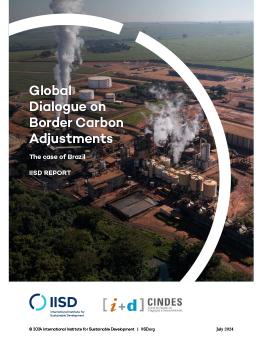
Global Dialogue on Border Carbon Adjustments: The case of Brazil
This report examines the potential effects of border carbon adjustment (BCA) schemes on Brazil, drawing insights from diverse stakeholders through extensive research and countrywide dialogues. It addresses challenges such as short-term impacts on exports, economic activity, and employment, amongst others. Recommendations emphasize the importance of balancing climate action with equity through international collaboration and best practices in BCA design.
-
The coming into force of the EU Carbon Border Adjustment Mechanism (CBAM) will impact exports of covered products from Brazil to the EU. Only a small share of Brazilian exports to the EU are covered by CBAM, so its effects on Brazil will be limited. However, Brazilian exports could be much more impacted by border carbon adjustments in other jurisdictions, such as the United States.
-
Brazilian exporters focus on ensuring that administrative burdens and compliance costs related to the implementation of border carbon adjustments are fair and do not provide disproportionate advantage to domestic producers.
-
Awareness of CBAM and other border carbon adjustment measures is the principal challenge in Brazil that could become a major obstacle as more such schemes arise.
This report is based on background research by IISD and Cindes to assess the potential impact of BCA schemes—particularly the EU Carbon Border Adjustment Mechanism (CBAM)—on Brazil, supplemented by detailed discussion in two dialogues organized within the country. The two dialogues heard the views and perspectives of stakeholders from the government, industry, think tanks and academics, civil society, finance providers, and labour. While acknowledging the need for BCAs to reach the Paris Agreement goals, these views and perspectives also outline the challenges for countries like Brazil, which include
- adverse impact on exports and thus on economic activity and employment in the short term,
- substantial cost of compliance,
- the investment needed to transform current production methods in the affected sectors.
The stakeholder discussion also led to recommendations for achieving balance between climate action and equity. One key conclusion is the need for international collaboration and use of best practices in the design of BCAs.
You might also be interested in
Border Carbon Adjustments: Pivotal design choices for policy-makers
This policy brief covers the pivotal choices in the design of border carbon adjustments, aiming to provide useful insights to policy-makers and set the ground for the broader discussions about the best practices.
Border Carbon Adjustments: Priorities for international cooperation
This IISD policy brief looks into border carbon adjustment design elements that are priorities for international cooperation, as well as the possible venues, formats, and shapes that such a discussion might take.
Border Carbon Adjustment Mechanisms and Impacts on Vietnam
This report consolidates, analyzes, and presents views and perspectives of stakeholders from Vietnam on border carbon adjustment (BCA) schemes to contribute to the global debate on BCA good practices.
The United Kingdom's Strategy for Carbon Border Adjustment in a Changing Global Landscape
This report consolidates, analyzes, and presents views and perspectives of United Kingdom stakeholders on its proposed Carbon Border Adjustment Mechanism (CBAM) to contribute to the global debate on international principles and best practices for national border carbon adjustment schemes.